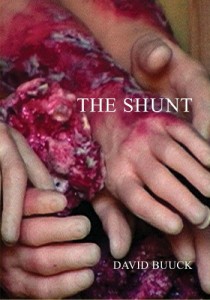Thursday February 23, 7pm-Poetry
David Buuck & Brian Teare
 David Buuck author of The Shunt ($15 Palm Press) speaks on Occupy Oakland and Police Brutality.
David Buuck author of The Shunt ($15 Palm Press) speaks on Occupy Oakland and Police Brutality.
“David Buuck’s first book is exquisitely focused and honed in on the torment of being alive in the world we live in, a citizen of the evil state of America. And a vulnerable human cell heavily implicated in capitalism. As a summary of the different formal experiments Buuck has tried out in the past ten years this book is marvelously effective, for he is the most impatient of poets and the one most disgusted with his own efforts. “Stanzas in Mediation 15-20” (“The Suck”) is my favorite of these dramatizations of self loathing. “Sure–I am/ a poet—against/ the war & a poet/ against “poets”/ “against the war” & I’m a poet against the post-/ war & well/ I’m not really/ much of a poet/ either, but & yet/ I’m just trying to do my part/ by Iraqifying/ my CD collection ]…]”–it just goes on like this taking strips of his flesh with it. When I first met him his Hamlet nature fascinated me, his mercurial balance of air and water, and now years later he steps forth, a Hamlet with balls.”
“Stuttering, hemming, hawing, failing, flailing, and flopping, the comedian tries to coerce the narrative ideology of wartime into a punch line, but the punch is always awready pre-packed by Big Brother’s Big Other. As Beckett almost observed, nothing is funnier (or sadder, depending on your tolerance for correct allegorical apprehension of permanent crisis) than someone trying repeatedly to slip on a flipping banana peel and getting shut down every time. The Shunt puts the “tic Alpo” back in “political poetry.”
Brian Teare author of Pleasure ($17.50 Ahsahta) Like Tennyson’s In Memoriam, Teare’s book sees within a personal loss evidence of an epochal shift at work, a shift at once historical, political, and cosmological. Asserting the lover’s body as a lost Eden, revisiting again and again the narrative of “the fall” “its iconic imagery as well as Gnostic reinterpretations” the book also records the eventual end of mourning and a return to the ecology not of myth but of the literal weather and landscape of California. The book is haunted throughout by the task of “writing the disaster” of AIDS; its lyrics link emergency to inquiry in an attempt to make a memorial “in language sufficient/to pain: not in itself the world: the thought of it.”
“…Where,/ if the world is flesh, to place the limit// between your body/ and the world?” I ask in the final poem of Pleasure, a question I lift from Merleau-Ponty’s The Visible and the Invisible. I could as easily ask where, if my life is language, to place the limit between the poem and my life, if only because the limit between them is so protean, and my ideas about and feelings concerning that limit likewise changea
